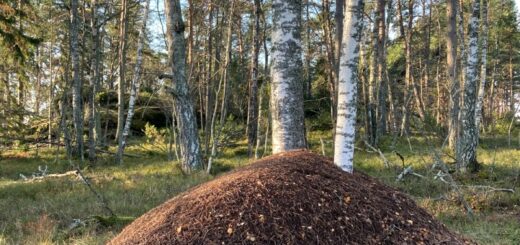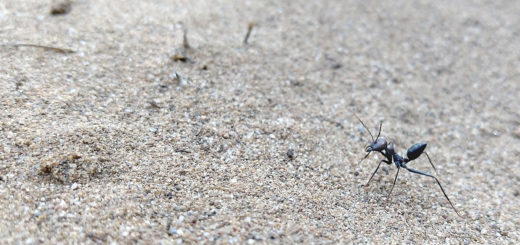Cognition in ants

In the recent review “Advanced cognition in ants” published in Myrmecological News, author Tomer J. Czaczkes reviews the disparate literature on advanced cognitive abilities in ants. “Advanced” is defined as requiring mental abstraction, internal self-reference, or control. He focuses on various abilities such as tool use, sequence learning (left-right turns), and learning of concepts (“same” vs “different”). Here, he highlights the main points by answering a few questions.
An Interview compiled by Phil Hoenle, Patrick Krapf, and Lina Pedraza

MNB: Could you tell us a bit about yourself?
TC: I’ve had exactly this beard since I was 17, dictated by the whims of my younger facial hair-growth pattern. But perhaps you’re looking for something research related?
I fell into ant behaviour research quite by accident – I always loved invertebrates, and I was looking for a BA thesis topic which would allow me to do research in the tropics. Prof. Owen Lewis, at Oxford, had a project available to go study leaf cutting ants in the tropics, and so I did. I fell in love with ants, and also how easy it is to work with them. I remember fondly putting in 4 hour workdays, occasionally fueled by the local rum, and managing to collect more data than the poor vertebrate researchers were managing in a month. 15 years later, the amount of rum-assisted research has alas declined somewhat, but I still argue that ants are some of the best and easiest model organisms for manipulative behavioural experiments. I now head the Animal Comparative Economics laboratory, where we study mostly ants, but also bumblebees, through the lenses of comparative psychology and behavioural economics.
MNB: Could you briefly outline the work you published in Myrmecol. News in layman’s terms?
TC: In this review, I dive into what is known about ‘advanced cognition’ in ants. Defining advanced cognition without resorting to jargon is almost impossible, but broadly it means managing to do tasks which require mental flexibility – not just innate abilities – and that can’t be explained by simple learning. It turns out there is evidence that various ants have some pretty advanced cognitivie abilities. We see things like tool use, self-control, pattern learning, and metacognition. However, there is almost always some alternative explanation for their behaviour which might not be considered advanced. The metacognition is a nice example: metacognition is ‘thinking about thinking’, for example being able to estimate how good your own memory is (‘metamemory’). Ants do a lot of things which look like they require metamemory: they seek out more information when they start making mistakes, and they provide more information (by laying pheromone) when the navigation task they are set is harder. But it could be that the ants are just responding to their own behaviour – for example laying more pheromone if it took them longer to find the food – rather than looking inside their own head.
MNB: What was the biggest obstacle you had to overcome in this project?
TC: Finding relevant work! There is a lot of excellent work on ant behaviour which can tell us a lot about ant cognition, but it is usually framed in a different way – as behavioural ecology, for example, rather than comparative psychology. The navigation literature on ants is especially rich, but the terminologies don’t overlap with the vocabulary used by cognition researchers and comparative psychologists. This often meant having to see work from a different perspective to the ones the authors were taking, and try to draw conclusions from the data about topics experiments were never meant to tackle. It also means that I have probably missed a lot of relevant work. If I missed your relevant work, dear reader, please drop me an email! Maybe in ten years we can write an update to this paper.
MNB: What was your motivation for this study?
TC: Research into the cognition of insects has really taken off in the last decade or so, but the vast majority of the work is being done on honey- and bumblebees. I’ve never really understood that, since they fly, sting, require lots of maintainence, and (for honeybees) only behave when the weather is good but not too many plants are flowering. My lab, and a few others (shout out to Patrizia d’Ettorre, Roxana Josens and a few others – you know who you are!), have started working in this space, but there is so much more to do. I hoped that by writing this piece, and beginning to digest the vast literature on ant behaviour from a cognitive perspective, I could encourage other researchers to join the myrmecological fun.
MNB: What is the take-home message of your work?
TC: Various ant species show a selection of impressive cognitive abilities. However, while some work has been done on ant cognition, the field is still wide open, with lots of low-hanging fruit waiting to be taken. Excellent discoveries await being made, requiring little more than a box of ants, some bits of paper, a few plastic cups, and some imagination. Unlike the honeybees and bumblebees, the wide variety of ecologies that ants have suggest a much broader range of cognitive abilities to be examined and discovered.
MNB: Do you have any tips for others who are interested in doing related research?
TC: Don’t be afraid! Getting going with ant work can be very easy and quick. Indeed, I even wrote a short guide to using my main tool for examining cognition in ants – the bifurcation maze. Just click here to check it out! You can start small, by simply quantifying associative learning, and then go fishing for a nice topic to examine – I provide a list of promising research avenues in the paper. Nicely, a lot of the conceptual heavy-lifting has often been done by researchers working on vertebrates or bees, so often preexisting protocols can be adapted with a bit of ingenuity.
MNB: Where do you see the future for this particular field of ant research?
TC: I think we still have to play a bit of catch-up with the field of bee cognition, and I think this is starting to happen. However, we should set our sights further than just replicating things with ants. I hope that we begin to really leverage some myrmecologicial knowledge for the study of cognition, taking advantage of the huge variety of ant ecologies and social structures. Species with gamergates and social ranks, for example, might be an excellent model for studying social cognition and theory of mind. While most cognition work, including my own, relies on foraging tasks, ants offer whole new behavioural dimensions to use – nest building, worker policing, brood management – all in a system where tens of nests can fit on a desk. Perhaps this more a hope than a prediction, but I hope to see ant cognition research taking its own, creative path forward. And AI and automated tracking, of course. That’s one direction in which all behavioural research is going, whether we like it or not.






Recent Comments